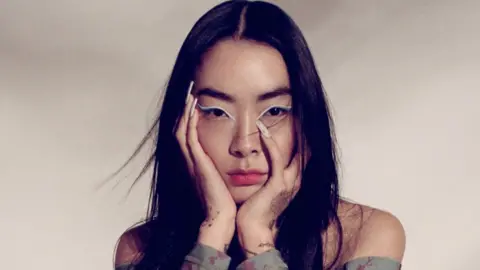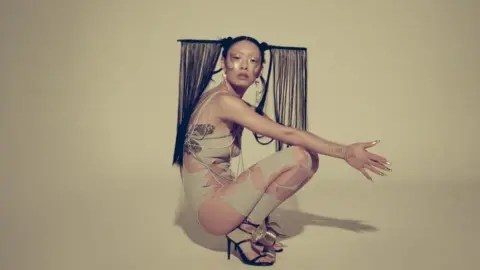Rina Sawayama: Turning familial pain into pop gold
 Hendrik Schneider
Hendrik Schneider"I had a proper identity crisis growing up," says singer-songwriter Rina Sawayama.
"I started to feel like things that had happened to me, like going to university, actually didn't happen. I doubted everything in my life."
To put her life back on track, she started a long, delicate process of digging through her family history and decoding her identity as a Japanese-British, pansexual woman.
"It was tough, definitely," she says, "but at the same time it was so cathartic."
It also produced one of 2020's best albums to date: A wild collision of pop, opera, house music and hair metal that paints Rina's demons into a strangely compelling self-portrait.
Over 44 minutes, the 29-year-old exposes her darkest moments - depression, racism, alienation, family trauma and internalised shame over her sexuality - but somehow makes it into something beautiful and colossally catchy.
"I don't want to say it helped me find peace, but this record is like my family album," says the singer. "It took decades, but I found my narrative."
Allow Google YouTube content?
Born in Niigata, Japan in 1990, Rina Sawayama moved to London at the age of five with her parents. She attended a Japanese school, learning calligraphy and dance alongside the typical curriculum subjects.
When she transitioned to a Church of England school at the age of 10, however, she absorbed other people's opinions of her family's "otherness", and found it difficult to integrate.
But the real bombshell came when her parents split up. It was a messy, painful affair, punctuated by arguments over money, and Rina found herself caught in the middle.
"My parents were constantly fighting and would use their kids to talk about it," she explains. "It was the classic, 'Oh your mum's like this', 'Well, your dad said this.'
"I just didn't know what was real and what wasn't because there were so many people telling me different things."
Wild child
Complicating matters was Rina's realisation that she was pansexual, a topic she still hasn't discussed properly with her parents. Then puberty hit.
"I had a serious hormonal spurt when I was 13 and I was a nightmare," she says.
"My mum and I were sharing a room until I was 15, which is not a vibe. Just too close. We'd have screaming arguments from 7am in the morning."
 Getty Images
Getty ImagesTo cope with the drama, she poured herself into schoolwork ("I'm a bit of a nerd") and threw herself into London's music scene. Even that landed her in trouble, though.
"I grew up near Camden, so I'd go to gigs all the time and not go home until 10pm on a school night, which really worried my mum."
On one occasion she even absconded to France after meeting a stranger at a Bravery gig.
"She was just like, 'You should come to Paris,' so I stayed in her Parisian home," says the singer. "It was filled with cats and she'd smoke and there was tar on the ceiling. It's such a crazy story now I think about it. I was fifteen!
"But it was literally the time of my life. That's where I discovered my love of music and my love of gigs and the community around music."
She revisits those years in an album track called Paradisin' - which tells the story of a night out interrupted by her mum's furious phone calls.
"We shared a laptop, so she would go on MSN Messenger and talk to my friends and be like, 'Hi, where's Rina? She hasn't come home,'" says the singer.
"So I'd be kissing some guy and mum would get his number and call him - which is pretty iconic.
"Mama Sawayama was like a sleuth. She was really after me. So I wanted that song to sound like a car chase."
Breaking the chains
Eventually, Rina did well enough at school to win a place at Cambridge, where she studied psychology, sociology, and politics.
The setting only amplified her feelings of alienation, however.
"You're introduced to the class you never grew up with: The future Boris Johnsons and the people who have the same surname as the library. I just did not understand that world whatsoever."
The university didn't have much of a music scene either, but it did influence her songwriting.
"I approach it like a dissertation," she laughs. "I like to have a couple of months where I'm researching what I want to write about and filling my head with words and reading books and watching movies and listening to podcasts."
 Hendrik Schneider
Hendrik SchneiderOn her debut album the essay is titled: "Won't you break the chain with me?" and each of the songs is a chapter, exploring different facets of intergenerational pain and cultural identity.
That might sound dour and worthy but, luckily, Rina's musical education came during one of pop's most ridiculous eras.
"The influence was chart music, and the charts in the early 2000s were chaotic," she says. "You had nu-metal one week and bubble-gum pop the next, then Pharrell and Timbaland pushing R&B the following week.
"I love all that music so I wanted to mish-mash it into the record. It's very pure. I wasn't trying to be cool."
The result is refreshingly bizarre: You don't expect to hear Destiny's Child melodies mixed with a Korn guitar riff (XS) or a Beethoven sonata mixed with the victory fanfare from Final Fantasy (Snakeskin) but inexplicably, it all works.
Allow Google YouTube content?
"There was so much family drama growing up that I wanted it to sound dramatic," she explains.
"It wasn't like, 'Yah! I just want to make people dance!' Maybe on the second album I'll do that but on the first one, there was stuff I needed to talk about."
Getting the album released wasn't easy, however. The grungy, abrasive guitars marked a tonal shift from the glossy pop of her buzzworthy 2017 debut EP, Rina.
Several record labels balked when they heard the debut single STFU! - an aggressive, explicit response to the racist and festishistic comments she receives as a Japanese woman living in the west ("Have you ever thought about taping your big mouth shut? 'Cause I have, many times," she sings in the chorus).
According to Rina, an unnamed major label pulled out of negotiations after she played them the track. She subsequently learned one of the executives had been calling her Rina Wagamama behind her back, somewhat proving the song's point.
The album was eventually snapped up by The 1975's record label Dirty Hit whose owner, Jamie Oborne, had no misgivings whatsoever.
"He was laughing hysterically; he loved it from the get-go," Rina recently told Billboard magazine.
His confidence in Rina's vision was rewarded when the album came out last week, with glowing reviews on both sides of the Atlantic. Rolling Stone called it a "thrilling musical adventure" while The Independent described the newcomer as "one of the boldest voices in pop today".
"Rina Sawayama," concluded Paper Magazine, "is our favourite genre".
 Getty Images
Getty ImagesThe singer has avoided the reviews - "I don't know if it's a good idea to read good stuff about yourself" - but says the album has received a thumbs up from the most important critic of all: Her mum.
"I sent it to her and she absolutely loves it," says Rina.
Mrs Sawayama even features on the final track, Snakeskin, reflecting on how she feels about life, in an interview Rina recorded on her 60th birthday.
"I've realised that now I want to see who I want to see, do what I want to do, be who I want to be," she says in Japanese.
It was a conclusion Rina had also reached in the course of making the album. Sharing the experience meant some of her residual anguish simply "melted away".
"People try to figure themselves out their whole lives by creating narratives," says the singer.
"Literally at the age of 27, when I started writing this record, I felt ready to understand that it's not like other people are trying to lie, you know?
"It's their version of the truth and this record is my version of the truth. There's something super-liberating about that."
Sawayama is out now on Dirty Hit.

Follow us on Facebook, or on Twitter @BBCNewsEnts. If you have a story suggestion email entertainment.news@bbc.co.uk.
